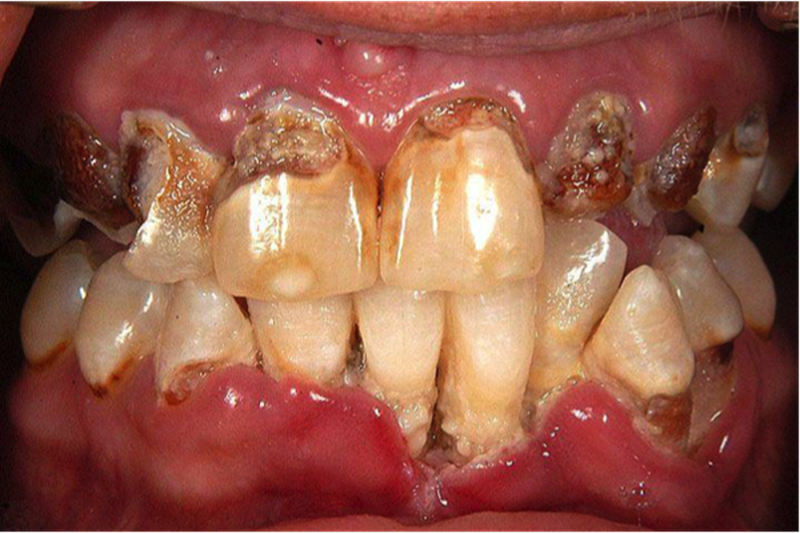What are the symptoms of trench mouth?
Trench mouth, also known as acute necrotizing ulcerative gingivitis (ANUG), is a serious gum infection characterized by specific symptoms. Here’s what to look out for:
1. Gum Symptoms
- Painful, Ulcerated Gums: The gums become painful and develop open sores or ulcers.
- Redness and Swelling: The gums appear red and swollen.
- Gum Bleeding: Gums may bleed easily, especially when brushing or flossing.
2. Oral Symptoms
- Bad Breath: A foul odor from the mouth is common.
- Metallic Taste: An unpleasant or metallic taste in the mouth may be present.
- Excessive Saliva: Increased saliva production can occur.
3. General Symptoms
- Fever: Mild to moderate fever may accompany the condition.
- Swollen Lymph Nodes: Lymph nodes in the neck may be swollen and tender.
- Fatigue: General feelings of weakness or fatigue.
4. Additional Signs
- White or Grayish Film: A gray or whitish film may cover the gums and teeth near the affected areas.
- Difficulty Eating: Painful gums can make chewing and swallowing difficult.
Trench mouth is a serious condition that requires prompt treatment. If these symptoms are present, it is important to seek dental or medical care to address the infection and prevent complications.
What are the causes of trench mouth?
Trench mouth, or acute necrotizing ulcerative gingivitis (ANUG), is caused by a combination of factors that lead to the infection and inflammation of the gums. The main causes and contributing factors include:
1. Bacterial Infection
- Pathogenic Bacteria: The condition is primarily caused by the overgrowth of certain bacteria, such as Treponema vincentii, Borrelia vincentii, and Fusobacterium nucleatum. These bacteria are part of the normal oral flora but can become pathogenic under certain conditions.
2. Poor Oral Hygiene
- Neglect of Oral Care: Inadequate brushing and flossing can lead to the buildup of plaque and tartar, creating an environment conducive to bacterial overgrowth and infection.
3. Stress
- Emotional or Physical Stress: High levels of stress can weaken the immune system, making individuals more susceptible to infections like trench mouth.
4. Nutritional Deficiencies
- Lack of Vitamins: Deficiencies in essential nutrients, particularly vitamin C (scurvy), can impair gum health and contribute to the development of trench mouth.
5. Smoking and Alcohol Use
- Tobacco Use: Smoking or chewing tobacco can irritate the gums and contribute to the development of trench mouth.
- Excessive Alcohol Consumption: Alcohol can dry out the mouth and reduce oral hygiene, increasing the risk of gum infections.
6. Immunosuppression
- Weakened Immune System: Conditions that impair the immune system, such as HIV/AIDS or other systemic diseases, can increase susceptibility to oral infections.
7. Other Health Conditions
- Underlying Medical Conditions: Chronic illnesses or conditions that affect overall health and immunity can contribute to the development of trench mouth.
8. Poor Nutrition and Health
- Inadequate Diet: A poor diet lacking in essential nutrients can compromise oral health and immune function, making it easier for infections to develop.
Addressing these underlying causes through improved oral hygiene, stress management, proper nutrition, and medical care is crucial for preventing and treating trench mouth effectively. If symptoms are present, consulting a healthcare provider or dentist for appropriate treatment is essential.
What is the treatment for trench mouth?
The treatment for trench mouth, or acute necrotizing ulcerative gingivitis (ANUG), aims to address the infection, relieve symptoms, and promote healing of the gums. The primary steps in treating trench mouth include:
1. Professional Dental Care
- Dental Cleaning: A dentist will perform a thorough cleaning to remove plaque, tartar, and debris from the teeth and gums.
- Scaling and Root Planing: Deep cleaning techniques to remove bacteria and smooth the tooth surfaces can help in healing the gums.
2. Medication
- Antibiotics: Prescription antibiotics, such as penicillin or metronidazole, are often used to target the bacterial infection causing trench mouth.
- Pain Relief: Over-the-counter pain relievers, such as ibuprofen or acetaminophen, can help manage pain and reduce inflammation.
3. Oral Hygiene
- Antiseptic Mouth Rinses: Using antiseptic or antimicrobial mouth rinses, such as chlorhexidine, can help reduce bacterial load and promote oral hygiene.
- Proper Brushing and Flossing: Maintaining good oral hygiene by brushing teeth at least twice daily with fluoride toothpaste and flossing daily to remove plaque and food particles.
4. Lifestyle Modifications
- Stress Reduction: Managing stress through relaxation techniques or counseling can help improve overall health and support healing.
- Dietary Changes: Consuming a balanced diet rich in vitamins and minerals, particularly vitamin C, can aid in gum health and recovery.
5. Symptom Management
- Warm Saltwater Rinses: Rinsing the mouth with warm saltwater can provide relief for sore gums and help reduce inflammation.
- Avoid Irritants: Steering clear of tobacco and excessive alcohol can prevent further irritation and promote healing.
6. Follow-Up Care
- Regular Check-Ups: Regular visits to the dentist are important to monitor progress and ensure that the infection is fully resolved.
7. Treatment of Underlying Conditions
- Addressing Nutritional Deficiencies: If deficiencies, such as vitamin C deficiency (scurvy), are identified, appropriate supplementation and dietary adjustments are necessary.
- Managing Systemic Conditions: Treating any underlying health issues or conditions that could contribute to the development of trench mouth.
Prompt treatment and adherence to oral hygiene practices are essential for resolving trench mouth and preventing recurrence. If symptoms persist or worsen, seeking further medical or dental evaluation is important.

Leave a Reply
You must be logged in to post a comment.